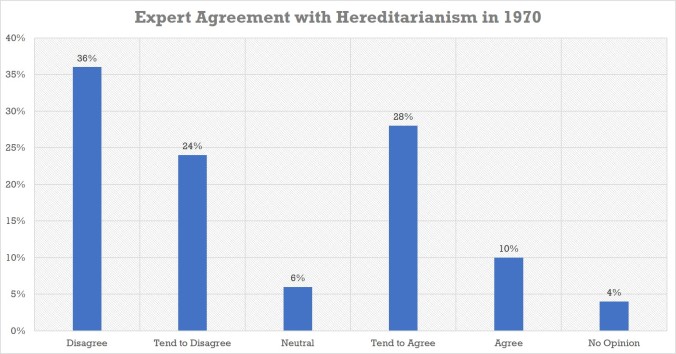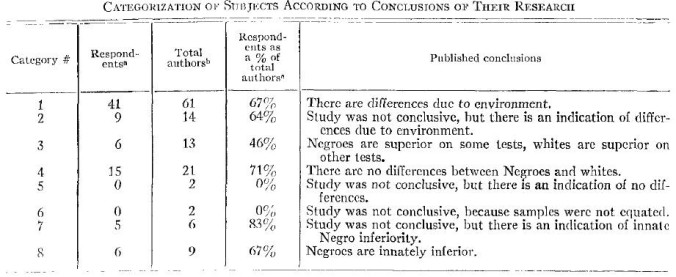In this post, I want to document the results of surveys of expert opinion on the causes of racial differences in IQ. As will be seen, the majority of experts in this area believe that genes are significantly involved in racial IQ disparities and this view has probably increased in popularity with time.
Rindermann et al. (2020)
The most recent survey of intelligence researchers comes from Rindermann, Becker, and Coyle (2020) who emailed 1237 researchers who had either published intelligence related work in an academic journal or who were a member of an organization related to the study of individual differences in intelligence. Rindermann et al. asked participants what portion of the Black-White IQ gap they thought was due to genes. Of the 1237 people emailed, 265, or 20%, responded.

On average, they believed that 49% of the Black-White IQ gap was caused be genes. Only 16% of these experts believed that none of the Black-White IQ gap was due to genes, and only 6% believed that the gap was entirely due to genes.
The response rate of Rinderman et al.’s survey, 20%, is somewhat low. It could be that the people who did not answer the survey would have responded in the same way who as those who did, but it is also possible that there was a systematic difference between those who chose to respond and those who chose not to.
It seems likely to me that if a difference existed it would bias the results in favor of environmentalism. This is just speculation, but the most obvious answer-related reason I can think of for not answering this survey is the politically incorrect nature of saying that genes are involved in the black-white IQ gap.
That being said, I wouldn’t be surprised if these results are reasonably unbiased since researcher’s names were not released with their responses.
Snyderman and Roth (1987)
Prior to Rindermann, the last survey of intelligence experts was Snyderman and Roth (1987) who mailed 1,020 academic psychologists, sociologists, and behavioral geneticists, asking them, among other things, whether the Black-White IQ gap was due to the environment, genetics, or both.
Of those mailed, 661 responded to the survey, giving it a response rate of 65%. In total, 45% of respondents said the Black-White IQ gap was due to genes and the environment, 24% said there wasn’t enough data to say, 17% didn’t respond, 15% said it was due only to the environment, and 1% said that it was due entirely to genes.

Synderman and Roth’s primary weakness is the vagueness of their question. Ideally, they would have asked participants to name the exact proportion of the Black-White IQ gap they thought was due to genes. However, they had a much higher response rate than Rindermann et al did. Taken together, these surveys provide reasonably strong evidence that most experts reject the view that the environment explains all of the black-white IQ gap.
Friedrichs (1973)
Prior to Synderman and Roth, the most recent survey I am aware of is Friedrichs (1973) who, in 1970, surveyed 526 members of the American Psychological Association, asking them to rate their agreement with the following statement from the IQ researcher Arthur Jensen: “It is a not unreasonable hypothesis that genetic factors are strongly implicated in the average Negro-white intelligence difference. The preponderance of the evidence is, in my opinion, less consistent with a strictly environmental hypothesis than with a genetic hypothesis.”

The response rate for the survey was 65% and most respondents rejected a genetic explanation.
However, the question Friedrichs asked was heavily loaded because it associated the viewpoint with a controversial figure during the height of their notoriety, and the quote was not worded in a particularly innocuous way.
Sherwood and Nataupsky (1968)
The earliest relevant research I am aware of comes from Sherwood and Nataupsky (1968) who had two people independently rate the conclusions of 82 researchers who had published work on racial intelligence differences. These researchers also filled out a survey which was then used to see what demographic variables predicted a researcher being more or less likely to support hereditarian conclusions. The two raters had a very high degree of independent agreement (r=.94) supporting the validity of their measure. Their frequency of each result can be seen below.

This research found that older researchers were more likely to publish environmentalist research, supporting the suggestion that environmentalism was more popular in the past.
Conclusion
From this survey data, the following seems reasonable to conclude: most researchers believe that both genes and the environment are involved in the Black-White IQ gap, this view is clearly more popular than environmentalism, and there is some evidence suggesting that environmentalism may have been more popular prior to the 1980s.
This story is intuitively plausible, as the modern race and IQ debate is widely seen as having started with an article by Arthur Jensen published in 1969. The 1970s and 1980s saw a huge amount of research in this area which could very well have convinced more researchers of a partially genetic explanation.
Reblogged this on .
LikeLike
Reblogged this on House of Wagner.
LikeLike
Hi Sean. I just started researching IQ and Race. Do you have any interesting research papers for me?
LikeLike